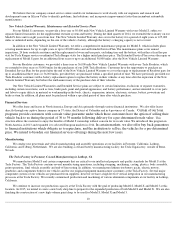Tesla 2015 Annual Report Download - page 21
Download and view the complete annual report
Please find page 21 of the 2015 Tesla annual report below. You can navigate through the pages in the report by either clicking on the pages listed below, or by using the keyword search tool below to find specific information within the annual report.
Our future growth is dependent upon consumers’ willingness to adopt electric vehicles.
Our growth is highly dependent upon the adoption by consumers of, and we are subject to an elevated risk of any reduced demand for,
alternative fuel vehicles in general and electric vehicles in particular. If the market for electric vehicles in North America, Europe and Asia does
not develop as we expect, or develops more slowly than we expect, our business, prospects, financial condition and operating results will be
harmed. The market for alternative fuel vehicles is relatively new, rapidly evolving, characterized by rapidly changing technologies, price
competition, additional competitors, evolving government regulation and industry standards, frequent new vehicle announcements and changing
consumer demands and behaviors.
Other factors that may influence the adoption of alternative fuel vehicles, and specifically electric vehicles, include:
In addition, reports have suggested the potential for extreme temperatures to affect the range or performance of electric vehicles, and
based on our own internal testing, we estimate that our vehicles may experience a material reduction in range when operated in extremely cold
temperatures. To the extent customers have concerns about such reductions or third party reports which suggest reductions in range greater than
our estimates gain widespread acceptance, our ability to market and sell our vehicles, particularly in colder climates, may be adversely impacted.
20
● perceptions about electric vehicle quality, safety (in particular with respect to lithium-ion battery packs), design, performance and
cost, especially if adverse events or accidents occur that are linked to the quality or safety of electric vehicles, such as those related
to the Chevrolet Volt battery pack fires or incidents involving Model S;
1
● perceptions about vehicle safety in general, in particular safety issues that may be attributed to the use of advanced technology,
including vehicle electronics and regenerative braking systems;
1
● negative perceptions of electric vehicles, such as that they are more expensive than non-
electric vehicles and are only affordable with
government subsidies;
1
●
the limited range over which electric vehicles may be driven on a single battery charge and the effects of weather on this range;
1
●
the decline of an electric vehicle
’
s range resulting from deterioration over time in the battery
’
s ability to hold a charge;
1
● varied calculations for driving ranges achievable by EVs, which is inherently difficult given numerous factors affecting battery
range;
1
● concerns about electric grid capacity and reliability, which could derail our past and present efforts to promote electric vehicles as a
practical solution to vehicles which require gasoline;
1
● concerns by potential customers that if their battery pack is not charged properly, it may become unusable and may need to be
replaced;
1
●
the availability of alternative fuel vehicles, including plug
-
in hybrid electric vehicles;
1
●
improvements in the fuel economy of the internal combustion engine;
1
●
the availability of service for electric vehicles;
1
●
consumers
’
desire and ability to purchase a luxury automobile or one that is perceived as exclusive;
1
●
the environmental consciousness of consumers;
1
●
volatility in the cost of oil and gasoline;
1
●
consumers
’
perceptions of the dependency of the United States on oil from unstable or hostile countries;
1
● government regulations and economic incentives promoting fuel efficiency and alternate forms of energy as well as tax and other
governmental incentives to purchase and operate electric vehicles;
1
● access to charging facilities, standardization of electric vehicle charging systems and consumers’ perceptions about convenience and
cost to charge an electric vehicle; and
1
●
perceptions about and the actual cost of alternative fuel.
1
























